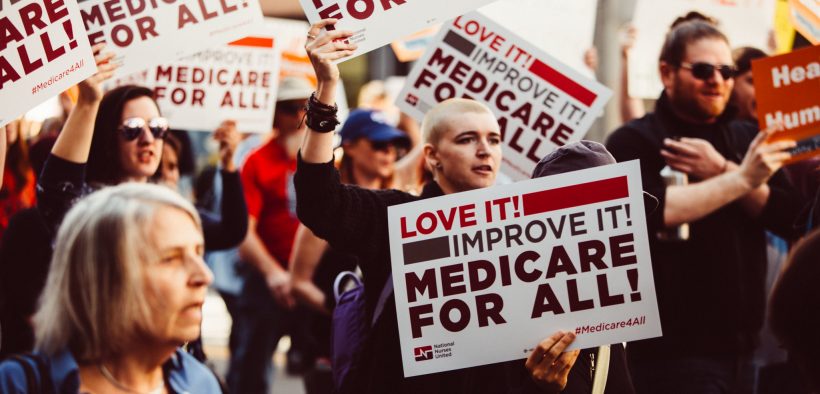Healthcare Giants Attack 2020 Democrats’ Healthcare Plans With Iowa Ad Blitz

The Partnership for America’s Health Care Future has always opposed Medicare for All. But lately it’s been going after moderate healthcare proposals, too.
(By Jessica Piper, The Center for Responsive Politics) A group of major drugmakers, insurance companies and private hospitals staunchly opposes Medicare for All and other healthcare plans proposed by 2020 Democrats. And it is spending big on ads in August to tell Americans why.
The Partnership for America’s Health Care Future — whose members include Blue Cross/Blue Shield, Pharmaceutical Researchers and Manufacturers of America and the Federation of American Hospitals— is spending more than $200,000 on TV ads this month, according to an analysis of Federal Communications Commission filings available in OpenSecrets’ political ad database.
PAHCF has also spent hundreds of thousands on Google and Facebook ads over the past few months. The ads criticize both Sen. Bernie Sanders’ (I-Vt.) Medicare for All plan and more moderate alternatives, such as a former Vice President Joe Biden’s proposed public option that would continue to allow for private insurance.
About half of the currently identified TV ads are running in Iowa, with the remainder targeting the Richmond, Va., market. The Facebook ads, which appear on the pages “Partnership for America’s Health Care Future” and “My Care, My Choice,” have mostly targeted voters in swing states, such as Pennsylvania, Michigan and Arizona, as well as early primary states.
“The politicians may call it Medicare for All, Medicare buy-in or the public option,” says one ad that aired on CNN during the presidential debates at the end of July. “But they mean the same thing. Higher taxes or higher premiums, lower quality care.”
The majority of the 2020 Democratic presidential candidates, including all those who are consistently polling above 2 percent, support expanding some form of government-run healthcare. Such an expansion would likely require tax increases, though candidates say their plans would bring down premiums and decrease overall healthcare costs for the average American.
The July debates, however, brought out some of the differences between the candidates’ proposals. Sanders and Sen. Elizabeth Warren (D-Mass.) have both called for single-payer healthcare, which would eliminate private insurance. South Bend, Ind., Mayor Pete Buttigieg has advocated for a system that would allow individuals to buy into Medicare or private insurance depending on their preferences.
On the debate stage, Biden, the only one out of the five leading candidates to support a public option, clashed with Sen. Kamala Harris (D-Calif.). Harris, who stumbled over healthcare early in her campaign, has proposed a long transition toward a Medicare for All system that still leaves room for private insurance.
The PAHCF, however, opposes such a revamp in favor of building on the Affordable Care Act, which was written a decade ago amid intense lobbying by the healthcare industry. Earlier drafts of the ACA included a public option, but it was dropped from the final bill.
In an op-ed published in The Hill earlier this year, the PAHCF’s executive director, Lauren Crawford Shafer, suggested expanding Medicaid in the states that have not already done so and increasing federal subsidies for low-income Americans. An overhaul of the healthcare system, she argued, would have unintended consequences for both healthcare providers and patients.
“Whether it’s called Medicare for All, Medicare buy-in or single payer, such proposals would dramatically reduce the amounts paid to doctors and hospitals, resulting in health care providers being forced to limit the care they provide,” Crawford Shaver wrote.
Currently, private insurers pay hospitals more than Medicare does for the same medical services. The differences can be jarring — for some procedures, private insurance pays more than double what Medicare does, according to a report from the Congressional Budget Office last year.
That means that hospitals are likely to lose out if more people switch from private health insurance to Medicare. Some groups have expressed concern that declining revenues would force providers to lay off employees and eliminate lower-paid services, or shut down hospitals in some rural areas entirely.
Several hospital-affiliated groups, including the Federation of American Hospitals and the American Hospital Association, are among the PAHCF’s 44 disclosed members.
Listed as a 501(c)(4) organization in IRS filings, the PAHCF is not required to disclose its funders and does not do so voluntarily. It received a $300,000 grant from the American College of Radiology Association, a 501(c)(6) trade association for medical professionals, sometime between July 2017 and June 2018.
Little else is known about the PAHCF, which launched in 2018. In addition to Crawford Shafer — a partner at Forbes Tate who worked on issues relating to the ACA at the Department of Health and Human Services under President Barack Obama — FCC filings name Paula Thresher as an executive. The group’s listed address is a co-working space in Washington, D.C.
















When will we learn? Unregulated capitalism is strictly a billionaire’s game. The little people (that’s you and me) are nameless, invisible, and 100% expendable. But, keep voting into Congress all those self-serving politicians who support this system — the ones whom you rate so lowly after you re-elect them, time after time.